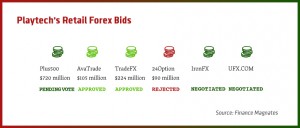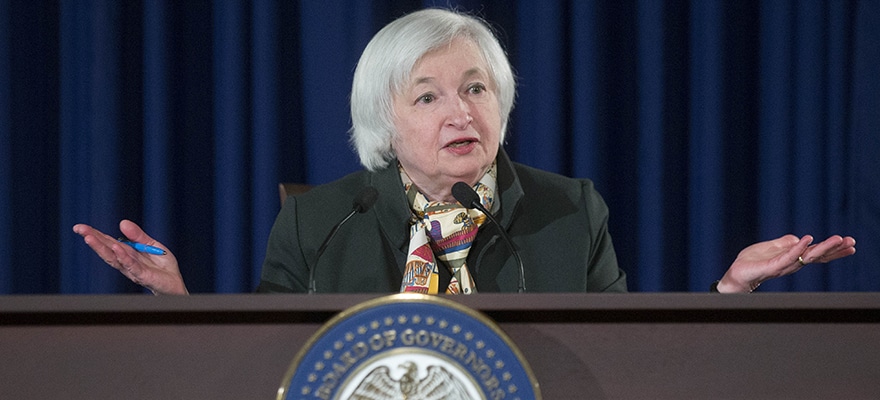Over the past week, the online financial trading industry saw a variety of developments, including the fall in share prices of two leading brokers, FXCM Inc (NYSE:FXCM) and Interactive Brokers (NASDAQ:IBKR).
FXCM’s share price troughed at $1.02 on Thursday, down from $1.30 at the start of the week. Friday saw a 17% recovery, with shares trading at $1.22 on Friday evening. As the share price threatened to dip below the value of a dollar, the company risked punitive action from the NYSE.
FXCM’s share price troughed at $1.02 on Thursday, down from $1.30 at the start of the week.
The fundamental reasoning for the move is technical in nature, with a planned reverse split of FXCM shares. The usual market sentiment in these situations resulted in increased volume of shares traded.
FXCM stocks have been flat since the catastrophic drop to the broker’s share price in the wake of the Swiss National Bank’s decision to unpeg the Swiss franc.
Likewise, Interactive Brokers (IB) shares have been on the decline since Monday. With the suspension of a number of stocks traded on the Chinese stock exchanges, investors have expressed concern about the functionality of a market which is heavily tilted by the government.
However, the drop comes on the back of strong annual growth. Indeed, IB stocks have rallied about 100 percent from a year ago, and are still trading over 50 percent higher than in the beginning on the year. The performance of the firm’s shares of during the past three months has also surpassed many industry peers, rising by almost 30 percent.
No account has ever gotten into a negative equity position.
Meanwhile, IB’s CEO ,Thomas Peterffy, was quick to quell concerns over the broker’s negative balance sheet following the Chinese stock market crash. In a conference call with analysts on Tuesday, he pointed out that “none of that is true.” He explained that the firm’s overall margin loans did contract by $2 billion due to “substantial liquidations.” But, Peterffy added that despite the liquidation, “no account has ever gotten into a negative equity position.”
Top Stories
Other noteworthy stories and developments included an exclusive interview with Ron Hoffman, Playtech veteran and newly appointed CEO of TradeFX. Hoffman discussed Playtech’s foray into the retail trading market, following the approval by shareholders of the acquisition of Plus500.

The strategic theme underlying a string of recent acquisitions was “synergies”. Specifically, Markets.com has been excelling with its customer acquisition and client retention strategy; Plus500 has created proprietary technology including its automated marketing machine and Trading Platform ; AvaTrade provides Playtech with a solid client base and a lucrative Japanese Financial Services Authority license.
We will continue to look at other similar businesses.
While Hoffman did not want to confirm suspicions of a Playtech IPO, he did indicate that the company’s growth-by-acquisition model was ongoing, stating: “We have already looked at several businesses on top of the ones we have made public, some of which have been picked up by the press, and we will continue to look at other similar businesses.”
On a regulatory note, the Cypriot watchdog is attempting to reign in the call centre activities of its licensed brokers. The Cyprus Securities and Exchange Commission (CySEC ) is now demanding a full list of all call centres worldwide.
Indeed, many Cyprus-based brokers’ operations are globally dispersed as they seek to benefit from price and skills concentrations. As such, many such operations, such as call centres, fall outside the reach of CySEC.
It can be assumed that CySEC will want brokers to make call centres either a tied agency or a wholly owned subsidiary.
As it tries to shed its image of being an “easy” regulator, it can be assumed that in the future CySEC will want brokers to make call centres either a tied agency or a wholly owned subsidiary. In this way, the licensed firms will bear full responsibility for the actions of the sales teams around the world and will not be able to use “regulatory arbitrage” to their advantage.
Finally, the UK watchdog has clamped down on the some of the activities of FINSA Europe Ltd. The company announced that two of its brands, Financial Spreads and Financial Spreads Plus, will cease to provide trading services. As such, clients have been notified that trading activities will be wound up, open positions closed, and access to the trading platform will be limited.
The firm reassured its clients that funds will continue to be held securely in segregated bank accounts and can be withdrawn by them at any time, and that any funds remaining on client accounts at the close of business today will be returned to its sources next week. No other brands of FINSA are affected.


















